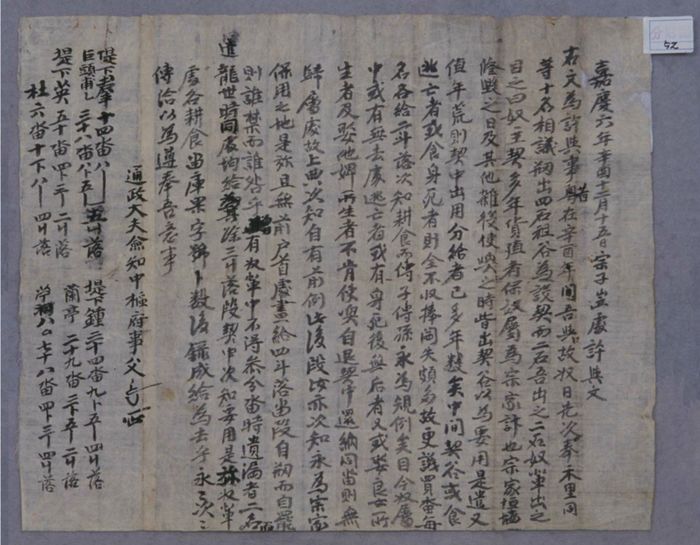(Translation) 1801年 李希誠 衿給文記
| Primary Source | ||
|---|---|---|
 |
Title | |
| English | ||
| Chinese | 1801年 李希誠 衿給文記 | |
| Korean(RR) | 1801년 이희성 깃급문기 (Yi Hui-seong gis-geub-mun-gi) | |
| Text Details | ||
| Genre | Social Life and Economic Strategies | |
| Type | Record | |
| Author(s) | 李希誠 | |
| Year | 1801 | |
| Source | ||
| Key Concepts | Master-slave Compact | |
| Translation Info | ||
| Translator(s) | Participants of 2018 Summer Hanmun Workshop (Advanced Translation Group) | |
| Editor(s) | ||
| Year | 2018 | |
목차
- 1 Introduction
- 2 Original Script
- 3 Discussion Questions
- 4 Further Readings
- 5 References
- 6 Translation
- 6.1 (sample) : Jaeyoon Song
- 6.2 Student 1 : (Write your name)
- 6.3 Student 2 : (Write your name)
- 6.4 Student 3 : Hu JIng
- 6.5 Student 4 : (Write your name)
- 6.6 Student 5 : Inho Choi
- 6.7 Student 6 : (Write your name)
- 6.8 Student 7 : King Kwong Wong
- 6.9 Student 8 : Younès M'Ghari
- 6.10 Student 9 : (Mengheng Lee)
- 6.11 Student 10 : (Ji-Hyun Lee)
- 6.12 Student 11 : (Write your name)
- 6.13 Student 12 : (Write your name)
- 6.14 Student 13 : (Write your name)
- 6.15 Student 14 : (Write your name)
Introduction
Original Script
| Classical Chinese | English |
|---|---|
|
嘉慶六年辛酉十二月十五日宗子岦處許與文 右文爲許與事 昔在辛酉年間 吾與故奴日先次奉禾里同等十名相議 刱出四石租谷爲設契 而二石吾出之 二石奴輩出之 因之曰奴主契 多年貨殖者 保奴屬爲宗家計也 宗家坦檣修毁之日 及其他雜役使喚之時 皆出契谷 以爲要用是遣 又値年荒 則契中出用分給者 已多年數矣 中間契穀[1] 或食或逃亡者 或食身死者 則全不收捧 閪失頗多 故更議買畓 每名各給二斗落[2]次知耕食 而傳子傳孫 永爲規例矣 目今奴屬中 或有無去處逃亡者 或有身死後無後者 又或娶良女所生者 及娶他婢所生者 不肯使喚 自退契中 還納同畓 則無歸屬處 故上典次知自有前例 此後段 汝亦次知 永爲宗家保用之地是旀 且無前戶首處劃給四斗落段 自刱而自罷 則誰禁而誰咎乎 曾有奴輩中 不得參分畓時遺漏者二名 而龍世時同處均給爲㫆 其餘三斗落段 契中次知要用是旀 奴輩處各耕食畓庫果 字號卜數後錄成給爲去乎 永永次次 傳給以爲遵奉吾意事 通政大夫僉知中樞府事 父 (着名署押)
(後錄 -생략)
|
(translation) |
Discussion Questions
Further Readings
References
- ↑ ‘契谷’은 契員이 出資한 곡식으로서 ‘契穀’이 맞으나 음가가 같으므로 ‘谷’자로도 흔히 사용하였다.
- ↑ 畓二斗落=600坪(1斗落=300坪, 1坪 =3.3058㎡)=1,983.48㎡=0.49ac(1ac=4,047㎡)
Translation
(sample) : Jaeyoon Song
- Discussion Questions:
Student 1 : (Write your name)
old document, slavery-slave compact, economic and social status of slaves , property distribution
- Discussion Questions:
Student 2 : (Write your name)
key words: slaves, master, compact, land, property, descendants
- Discussion Questions:
Student 3 : Hu JIng
- key words: yangban-nobi relation, economic life in Joseon, compact, social mobility in Joseon
- Discussion Questions:
Student 4 : (Write your name)
Inheritance Practices, Transformation of Korean slavery system
- Discussion Questions:
Student 5 : Inho Choi
Master-Slave compact, Inheritance, Choson Slavery, Choson social history, Social Mobility
- Discussion Questions:
Student 6 : (Write your name)
- Discussion Questions:
Student 7 : King Kwong Wong
- Keywords:
economic and social relationship between master and slaves, changing social condition, hereditary status of slaves
- Discussion Questions:
Student 8 : Younès M'Ghari
- Key Concepts:
master-slave contract, legacy transmission, usage of slaves
- Discussion Questions:
Student 9 : (Mengheng Lee)
- keyword:
slavery, the social status system, and social mobility in Chosŏn Korea, slave-master compact, and documents of distribution of property.
- Discussion Questions:
Student 10 : (Ji-Hyun Lee)
奴主契 slave-master compact,
奴婢 slavery
宗家 head-family
分財記 inheritance document
land and property distribution
Chosŏn contract
- Discussion Questions:
Student 11 : (Write your name)
- Discussion Questions:
- Key Concepts: Changing social strata in the turn to 19c Joseon
Student 12 : (Write your name)
- Discussion Questions:
Student 13 : (Write your name)
- Discussion Questions:
Student 14 : (Write your name)
- Discussion Questions: